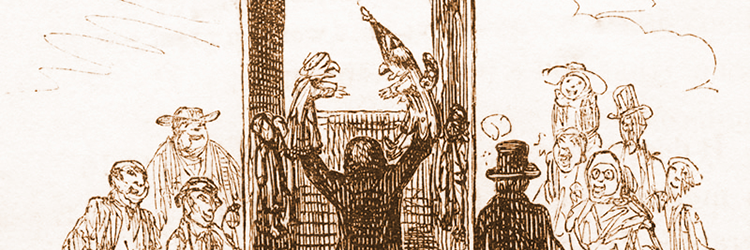 Dr Barnaby Dicker (Visiting Tutor in Critical and Historical Studies) and Dr Marquard Smith (Research Leader and Head of Doctoral Studies) of School of Humanities, Royal College of Art, London write about their innovative Being Human festival project.
Dr Barnaby Dicker (Visiting Tutor in Critical and Historical Studies) and Dr Marquard Smith (Research Leader and Head of Doctoral Studies) of School of Humanities, Royal College of Art, London write about their innovative Being Human festival project.
Humanities at the Royal College of Art
Our proposal for Punch and Judy’s Chocolate Cornucopia grew out of some very clearly-felt general intentions. As a base principle, we wanted to accurately, or at least, appropriately, reflect the distinctive situation of the School of Humanities within the Royal College of Art. The School is relatively new, and nestles beside the College’s numerous studio-based art and design programmes. The question raised here is not ‘how do the arts fit into the humanities?’ but ‘how do the humanities fit into the arts?’ Within this arts-related frame, the range of research found in the School is very diverse. Consequently, we felt obliged to develop a project that accommodated multiple viewpoints and interests. Furthermore, we wanted to offer something experimental, open, ‘of the arts.’
This was also, we felt, an opportunity to construct something specifically for the festival (and its remit), that would, above all, be anchored very much within the public sphere. We wanted to offer something lively, interactive, conversational (or ‘dialogic’). This would be playful, even humorous, we decided. We did not want to broadcast a predetermined academic discourse; we would not offer a lecture series or conference. In other words, our contribution (for better or worse) would not be signed, sealed and almost already ready for delivery in November. Taking inspiration from Mikhail Bakhtin and certain strands of arts practice and theory, we envisaged a ‘dialogic’ or ‘relational’ humanities, an opportunity for academia to listen and converse, as well as speak.
The concept
The concept and structure of Punch and Judy’s Chocolate Cornucopia of Human Knowledge is simple. It is also in some ways hard to explain. As noted, it is an experiment. The experiment has a number of strands:
1. At the festival event our Punch and Judy will converse with willing passers-by over cups of hot chocolate. We are interested less in the numbers of willing passers-by or hot chocolates drunk, than we are in who wants to talk and about what. Our Punch and Judy are human performers, and therefore more Commedia dell’arte than puppet show.
2. How will these conversations play out? All we know at this point is that they will take their initial direction from the interests and concerns of the passers-by. (The conversations will be logged and photographed).
3. As so-called ‘stock characters’ Punch and Judy will be primed for conversation with key ideas regarding the humanities in daily life. Where do we get these key ideas, you ask? From the Cornucopia of Human Knowledge, of course! That is, via short contributions from anyone and everyone across the nation, even the world.
Get involved
Take part please read our call for participation. Contributions will be archived online at the International Association for Visual Culture website. Together, as noted, they constitute the Cornucopia of Human Knowledge that Punch and Judy will chocolatise during the festival. The experimental question here is what suggestions do people have regarding the role of the humanities in daily life? What ideas, methods, histories, etc. are playing or could play an active role in our day-to-day activities and interactions? We (the event coordinators and the festival organisers) can do little more than promote this call for contributions. At a stretch we can pester a few people. What we cannot do is force people to write a one page statement – they have to want to. Who and how many will make this effort? And what insights, topics, formulations and propositions will they offer?
The carnivalesque
A final point. Our event – we hope – belongs in part to the carnivalesque. Bakhtin perceived this important cultural “entity” being increasingly squeezed out of daily life over the centuries by ‘official’ culture, but finding havens first in marketplaces and festivals, and later in the arts, principally theatre and literature. Wherever one finds a chaotic, subversive muddle of voices, styles, registers or modes interacting with one another and, together, resisting fixity one might choose to see the carnivalesque at work.
Our event will happen at the Platform@Oxo, Oxo Tower Wharf, Bargehouse Street, South Bank, London, SE1 9PH. This is a perfect location, not only in terms of (human) geography, but above all because Oxo Tower Wharf is part of the Coin Street Community Builders social enterprise – a project whose ethics chime with our own.
_______________________________________________________
Logo image of Punch and Judy by Kate Dicker

